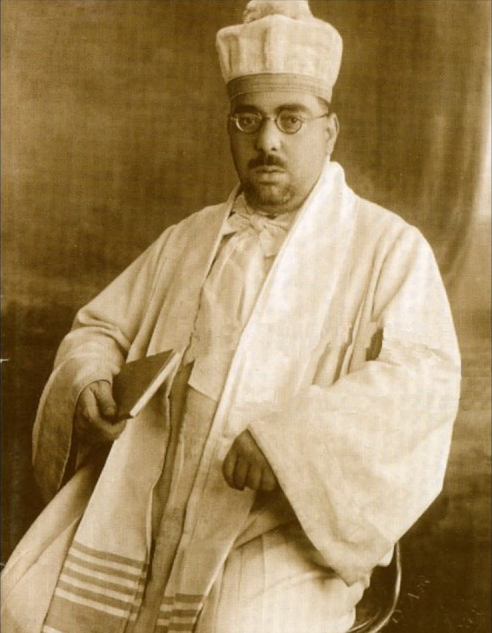
(Izmir, 1889 – Montevideo, 1950)
Izak Algazi was one of the foremost names in recent Jewish history, and possibly the greatest Sephardic musician of the early twentieth century. Algazi not only garnered the admiration of Jews alone, but of Turks as well. In his time, he became a well-known artist in all musical circles, and because of his mastery and knowledge of music, he was referred to by the Turks as “Efendi” and “hoca” (teacher). Algazi was one of the first Jewish singers from the Middle East to publish numerous commercial records, from 1909 to the late 1920s. The recordings he made, for both religious and secular songs, are valuable evidence of Sephardic musical creation in the last decade of the Ottoman period.
Algazi was born in Izmir on April 24, 1889. He was the son of Solomon Algazi and Sarah Mizrahi, a descendant of an ancient and distinguished family from Izmir whose roots date back to Solomon Ben Abraham Algazi who lived from 1610-1683. Izak was the third generation of the cantor dynasty along with his grandfather Haim Menahem Algazi and his father Solomon “Bulbuli” (Zamir) Algazi. Algazi was educated in a vibrant atmosphere characterized by the tension between traditional religious norms and thinking and modern behavior that influenced the Jewish communities in the Ottoman Empire. He received a European education in the Alliance schools and a traditional education in the Talmud Torah. He later studied at the Hillel Yeshiva with Rabbi Abraham Pelah, the Chief Rabbi of Izmir and one of the most important educators of Turkish Jewry.
Algazi studied Jewish liturgical music with his father Solomon as a model, and Turkish classical music with Ottoman Jewish composer Shem Tov Shikyar (1840-1920). At an early age he joined the choir of the Portuguese Synagogue. Apart from Turkish music, Algazi was also knowledgeable in European music, through European musicians, opera bands and music groups, most of them from France, who often came to Izmir and appeared to the Jewish audience. In 1908 he was appointed cantor in the Central Synagogue of Izmir, Beth Israel. Although members of the Jewish community in Izmir recognized his exceptional musical talent, he suffered financial difficulties in his youth and had to supplement his income by giving private lessons in music for children.
Following the turmoil following World War I and the conquest of Izmir by the Greeks from 1919-1922 the local Jewish community suffered a severe crisis. Its leadership had to leave Turkey because of the suspicion that they were cooperating with the Greeks. Unemployment and the search for new horizons pushed Algazi, in 1923, to Istanbul with the blessing of Turkey’s Chief Rabbi, Rabbi Chaim Bejarano. Algazi was appointed cantor and musical conductor at the Italian Synagogue in Galata, a synagogue known for its developed musical activities. While in Istanbul, from 1923-1933, Algazi was active in the field of Jewish education and shaping the relationship between the Jewish community and the Turkish Republic. He was a keen advocate of Ataturk, and Algazi supported his modernization efforts. Thanks to his broad knowledge, among others in the fields of music, literature, history and philosophy, Algazi found his place among the young Turkish intellectuals. Moreover, Algazi sang at the residence in the Presidential Palace in Dolma Bache and lectured on history and art music.
In 1933 Algazi left Turkey and moved to Paris, where he served as cantor of the Grande Synagogue de Paris. At the same time, he completed his studies in a rabbinical seminary. In spite of all his actions he did not find his place in Paris, a place where he could develop his abilities besides his actions as a cantor.
In 1935, Algazi made his way to Montevideo, Uruguay, where many other immigrants from Izmir had settled. There Algazi served as cantor and spiritual leader of the Sephardic community. Far from his birthplace and important Sephardic centers in Europe, he found in Uruguay a young community ready to accept his leadership. He also served as a cantor in the Jewish communities of Brazil, Argentina, and Chile.
Algazi helped promote the Latino branch of the Zionist movement, helped to resettle Holocaust refugees, collect donations from the Jewish Appeal, and establish the World Sephardi Federation. His vigorous activities helped save Jews and advance the anti-Nazi policies of the Uruguayan authorities. Algazi’s house served as a refuge for European Jewish refugees who arrived in Uruguay where he hosted and encouraged them. In early 1944, together with another Sephardic leader, Jacob Hazan, he founded the Pro-Palestine Committee in Uruguay. The purpose of the committee was to recruit non-Jewish figures to advance the Zionist goal. Subsequently, this committee was active in achieving the commitment of Uruguay to the establishment of the Jewish state in Palestine.
Algazi died at his home after a sudden stroke on March 3, 1950. He can be seen as the last link in a chain of distinguished Sephardic poets and musicians in Turkey that began in the first half of the sixteenth century. These musicians created a composition of Ottoman Turkish music and Hebrew poetry that echoed the synthesis between Muslim and Hebrew culture in medieval Spain. Algazi wrote religious Hebrew poetry and adapted it to Turkish classical music. These poems, similar in structure and style to the poems of his predecessors, consist of four structures with only four short sentences or only four long sentences, always with the acrostic “Isaac.”
In 1938, Moshe David Gaon noted that “Algazi was known throughout Turkey’s cities and elsewhere as ‘נעים זמירות ישראל’ (Pleasant Singer of Israel). After Algazi’s death, the renowned collector of Sephardic songs, Isaac Levy, called him “the greatest Sephardic singer in the first half of the twentieth century” and “the Prince of Jewish Eastern Music.”
Source: Professor Edwin Seroussi and the Jewish Music Research Centre at the Hebrew University of Jerusalem. More information here.
